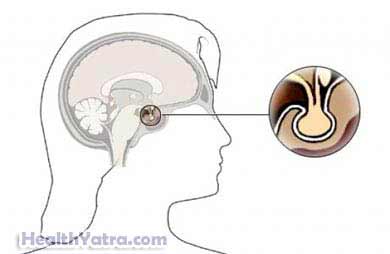Definition
Diabetes insipidus is a condition where water in the body is improperly removed from the circulatory system by the kidneys.
There are two forms of diabetes insipidus (DI):
- Central diabetes insipidus (central DI)
- Nephrogenic diabetes insipidus (NDI)—due to renal cells in the kidneys not responding to ADH
Causes
Antidiuretic hormone (ADH) controls the amount of water reabsorbed by the kidneys. ADH is made in the hypothalamus of the brain. The pituitary gland, at the base of the brain, stores and releases ADH. Central DI occurs when the hypothalamus does not make enough ADH. NDI occurs when the kidneys do not respond to ADH.
Some diabetes insipidus is casued by genetic problems that lead to central DI or NDI. Others may develop after an injury or illness.

Risk Factors
Factors that may increase your risk of diabetes insipidus include:
- Damage to the hypothalamus or pituitary glands due to surgery, infection, tumor, or head injury
- Certain conditions (eg, sarcoidosis, tuberculosis, granulomatosis with polyangiitis)
- Certain medicines (eg, lithium)—the most common cause of diabetes insipidus
- Kidney disease (eg, polycystic kidney disease)
- Protein malnutrition
- Certain conditions (eg, hypercalcemia, hypokalemia)
Symptoms
Symptoms may include:
- Increased urination, especially during the night
- Extreme thirst
- Dehydration (fast heart rate, dry skin and mouth)
Diagnosis
Your doctor will ask about your symptoms and medical history. A physical exam may be done.
Tests may include the following:
- Blood tests
- Electrolyte levels
- Kidney function tests
- ADH levels
- Blood sugar to look for diabetes mellitus
- Urinalysis
- Urine specific gravity and/or osmolality (measures how concentrated or dilute the urine is)
- Urine volume tests to see how much urine is being produced
- Water deprivation test
- Only done under doctor supervision
- Urine output is measured for a 24-hour period
- Magnetic resonance imaging (MRI) of the head—if central CDI is suspected
Treatment
Talk with your doctor about the best plan for you. Your doctor will work with you to address the underlying cause.
Treatment may include:
- For central DI—taking a synthetic form of ADH
- For NDI—following a low-sodium diet, drinking plenty of water, taking a diuretic (water pill)
Prevention
There are no known ways to prevent diabetes insipidus. Talk to the doctor right away if you have excessive urination or thirst.
Keywords :
Diabetes Insipidus Definition, Diabetes Insipidus Causes, Diabetes Insipidus Symptoms, Diabetes Insipidus Complications, Diabetes Insipidus Surgery Cost in India, Diabetes Insipidus Treatment Hospital in India, Diabetes Insipidus Treatment in India, Diabetes Insipidus Doctors in India, Diabetes Insipidus Meaning in Hindi, Diabetes Insipidus Meaning in Bengali, Diabetes Insipidus Meaning in Arabic, Diabetes Insipidus Treatment cost in 2024, Diabetes Insipidus Hospital in India, Diabetes Insipidus Treatment Near Me, What is the best treatment for diabetes insipidus?, How do you treat diabetes insipidus permanently?, What is the drug of choice for diabetes insipidus?, Can you live a normal life with diabetes insipidus?
